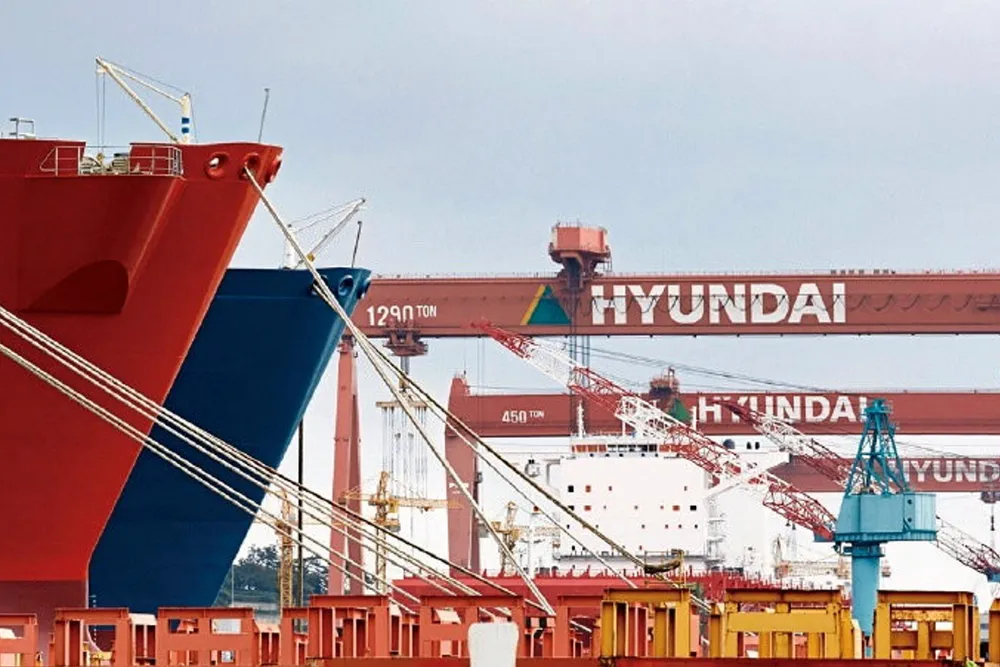New FPSO orders start leaking to South Korea from China
Chinese yards are being labeled as low-productivity behemoths as labour costs rise and renewable energy changes the landscape

China may be losing the competitive advantages it has enjoyed for years over South Korea and other Southeast Asian countries in terms of building and delivering floating production, storage and offloading vessels.
Rising labour costs and labour shortages as well as overall yard capacity limitations have tarnished China’s prominence in the delivery of FPSOs on schedule and on budget, a senior industry executive has warned.
Addressing delegates at the 8th FPSO & FLNG & FSRU Global Summit, held last week in Shanghai by CDMC, Bai Liguo, the project director of Modec Offshore Production, said that China’s advantage has eroded when it comes to manufacturing labour cost and overall cost for FPSO project execution.
“Yards in China are losing competitiveness and some projects are starting to move back to South Korea and Southeast Asia,” he said.
Bai Liguo suggested that constraints on labour supply and other resources will make it difficult for project's to be delivered on time.
"Low productivity giants"
Labour costs have increased with each passing year, but productivity has not improved at the same pace, he added.
“Yards in China are becoming low-productivity giants,” he said.
He said that high demand for critical resources for green energy projects has seriously squeezed the supply of heavy lift floating cranes and transportation barges.
“Mobilization could be extremely difficult and costly,” he said, adding that the Covid-19 pandemic and travel restrictions had changed the business landscape drastically, and the localization of client supervision teams has become a trend, which has indirectly pushed up yard supervision costs.
He called on Chinese yards to invest in productivity improvements and human resources as well as innovation and new technology application to stay ahead of the competition.
Of the total 51 FPSO construction awards over the last five years, 18 went to China, accounting for 35% of the total, according to Bai.
Xu Yun, senior analyst of Energy Maritime Associates (EMA) echoed Bai’s comments on Chinese yards, agreeing that the fabrication of FPSO hulls is returning to South Korea.
In recent months, Korean yards have grabbed a number of FPSO hulls. Samkang M&T was awarded the hull contract for the BW Offshore-owned Barossa FPSO bound for Australia.
Hyundai Heavy Industries won the contract to build the P-78 FPSO hull for Petrobras and a semi-submersible production facility for Beacon Offshore’s Shenandoah field development in the US Gulf of Mexico.
Samsung Heavy Industries has been contracted to build Eni’s Coral South floating liquefied natural gas vessel and the MJ FPSO for India's Reliance Industries.
In addition, Petrobras has awarded a joint venture led by Daewoo Shipbuilding & Marine Engineering a sizeable contract to supply the eighth FPSO (P-79) for the Buzios pre-salt field.
Xu Yun said the FPSO fleet size has reached plateau as ageing units are being retired as the number of units has reduced to 195 this year from last year’s 200.
Of the total 195 FPSOs, 166 are in operation, with the remainder being idle without contracts, accounting for 63% of the total number of idled floating production units.
Xu said there will be between 70 and 155 FPSO ordered from 2022 to 2026 based on EMA’s oil price forecast scenarios of between $30-$50 per barrel and $70-$90 per barrel.
She added that over the next five years until 2026 the capital investment for FPSOs will reach $96 billion including $33 billion needed for FPSOs in Brazil, $16 billion for units for Africa and $10 billion for South America.
Since early this year, seven new FPSOs have been ordered including four for Brazil.
(Copyright)